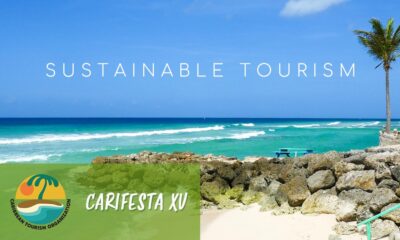Deandrea Hamilton
Editor
Barbados, February 21, 2025 – There is trouble in paradise, and it has not escaped the attention of the United Nations, as Antonio Guterres, UN Secretary General on Friday (February 21) commended host prime minister for her unerring words as he acknowledged what is an unequivocal truth for the Region; “wave after wave of crisis is pounding your people and your islands with no time to catch your breath before the next disaster strikes.”
Barbados is host country to the 48th Regular Meeting of the Conference of Heads of Government of the Caribbean Community and Mia Mottley, Prime Minister of Barbados set and unapologetic tone for the session which was held from February 19-21.
“The only way we will make it through these difficult times, is if we are prepared to be more unified and bolder than ever,” said Mottley, chairperson of the CARICOM.
The Secretary General pointed to socio-economic fall out from a string of existentially threatening events, none of which originate within the Caribbean region.
“Geopolitical tensions fuelling uncertainty. The scarring effects of COVID-19 leaving a trail of socio-economic crisis. Soaring debt and interest rates, on top of a surge in the cost of living. All amidst a deadly swell of climate disasters – ripping development gains to shreds and blowing holes through your national budgets. And all as you remain locked-out of many international institutions – one of the many legacies of colonialism today.”
It was a central point when host, Mia Mottley spoke to the audience assembled at the Lloyd Erskine Sandiford Centre.
“You have heard everybody on this platform this evening and what is clear is that it cannot be business as usual. We have come to Bridgetown, in this year of 2025 at a time when the world is reeling,” she said pointing to the heartfelt expressions already delivered by immediate past chairman of CARICOM, Dikon Mitchell, Prime Minister of Grenada.
“We know what it is, each summer, to have to hold our breath and to wait and to hope that this is not going to be our turn. We know firsthand, how the world has become an awful place since the pandemic, where all of the warts and all of the scars and all of the cuts have become very, very clear and open for all to see and where effectively, the world has said ‘might is right’ and where small states are often excluded because our orders are too miniscule to command attention.”
Guetteres sided with the plight echoing from the CARICOM pulpit at the opening ceremony, listing three area which stack up as top priorities.
“I see three key areas where, together, we must drive progress. First, unity for peace and security. Second, unity on the climate crisis. Because, third, we need unity for sustainable development.”
Haiti, and its years of unrest and chaos, which is now fuelling a deadly humanitarian crisis absorbed the lion’s share of the Sec-Gen’s attention in terms of security for the region.
“CARICOM, and the Eminent Persons Group, have provided invaluable support. We must keep working for a political process – owned and led by the Haitians – that restores democratic institutions through elections.
And I will soon report to the United Nations Security Council on the situation in Haiti, including proposals on the role the UN can play to support stability and security and address the root causes of the crisis.”
While an announcement to restore this fledgling democracy through a general election in November has been made, there is doubt expressed that Haiti is progressing enough to hold a national poll.
“It is my intention to present to the Security Council a proposal that is very similar to the one that we have presented for Somalia, in which the UN assumes the responsibility of the structural and logistical expenditures that are necessary to put the force in place. And the salaries of the force are paid through the trust fund that already exists.
And if the Security Council will accept this proposal, we will have the conditions to finally have an effective force to defeat the gangs in Haiti and create the conditions for democracy to thrive.”
A multi-national force deployed to Haiti has had some impact, but those looking on had higher hopes for the Kenyans, Jamaicans, Bahamians and others are fighting against ruthless gangs on the ground. A mission which is estimated to cost $600 million has also not been fully funded; it is said over 5,600 have been killed and more than a million people are displaced.
Many have lost hope and see peace for the Republic as elusive, even as leaders press on.
“I urge you to continue your work and advocacy to tackle the weapons and drug trafficking that is fuelling violence across the region, including through prevention.”
Crime has been spurned by gun and illicit drug trafficking in the islands; all recording harrowing murder tolls with crippling spikes in violence. The Secretary General pointed to the push and pull factors sustaining these nefarious industries and the countries where these items, which are outlawed in the Caribbean, are coming from and to where they are going.
“Without their cooperation, we will never be able to win this battle, and the people of the Caribbean are paying a heavy price for the lack of cooperation that unfortunately, we still face,” said Guterres.
Adaptation, in the face of a changing climate is expensive and for the low-lying lands of the Caribbean region, there is an urgency for funding which must remain in the spotlight, according to the UN boss.
“This year, countries must deliver new national climate action plans, ahead of COP30, that align with that goal, with the G20 – the big polluters – leading the way. This is a chance for the world to get a grip on emissions.”
Despite the hearty pitches and persuasive presentations, the effort to fulfill financing commitments to push back against climate change continues to gain little traction. A shift in presidency in the US is expected to further stifle progress to hit the targets agreed upon in the Paris Treaty.
The Secretary General admonished the small island developing states to “seize the benefits of clean power. To tap your vast renewables potential and to turn your back on costly fossil fuel imports. But this requires finance.”
Guterres informed, “We need confidence that the $1.3 trillion agreed at COP29 will be mobilized. And we need the world to get serious in responding to the disasters that we know will keep coming.”
But climate change funding is not the only area in need of resources, according to the secretary general.
“Globally, the Sustainable Development Goals are starved of adequate finance, as debt servicing soaks-up funds, and international financial institutions remain underpowered. Caribbean countries have been at the forefront of the fight for change – pioneering bold and creative solutions. And the Pact for the Future agreed last year, together with the Bridgetown Initiative, now 3.0, marks significant progress – and I thank you all for your support. The Pact commits to advancing an SDG Stimulus of $500 billion a year.”
The UN also believes debt recovery is a mammoth of a mountain standing between financial stability and unending debt for the Small Island Development States. The disparities are now legendary, and the changes are slow-going.
There was some advice and assurances offered by the secretary general, one of the specially invited guests at that 48th Regular Meeting.
“A unified Caribbean is an unstoppable force. I urge you to keep using that power to push the world to deliver on its promise. And I can guarantee that the United Nations and myself are with you, and will remain with you, every step of the way.”


 Bahamas News1 week ago
Bahamas News1 week ago
 Bahamas News1 week ago
Bahamas News1 week ago
 Health1 week ago
Health1 week ago
 News4 days ago
News4 days ago
 Caribbean News9 hours ago
Caribbean News9 hours ago























